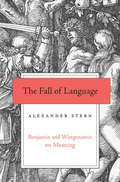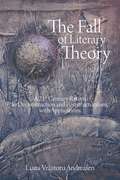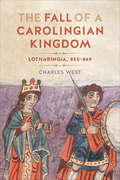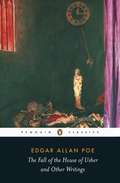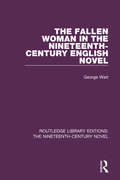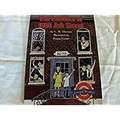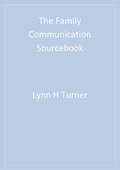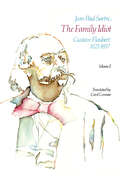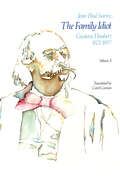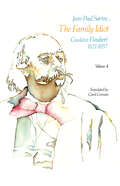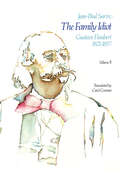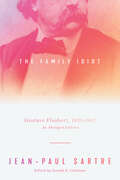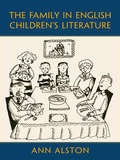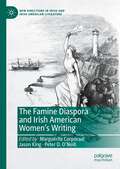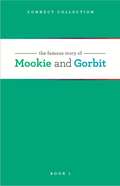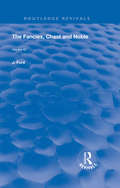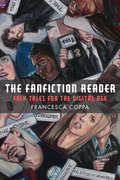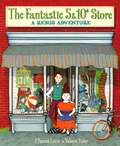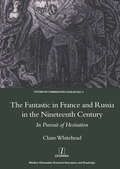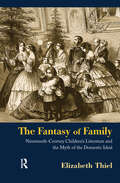- Table View
- List View
The Fall of Language: Benjamin and Wittgenstein on Meaning
by Alexander SternKnown for his essays on culture, aesthetics, and literature, Walter Benjamin also wrote on the philosophy of language. For Alexander Stern, his famously obscure—and, for some, hopelessly mystical—early work contains important insights, anticipating and in some respects surpassing Wittgenstein’s later thinking on the philosophy of language.
The Fall of Literary Theory: A 21st Century Return to Deconstruction and Poststructuralism, with Applications
by Liana AndreasenThe book revives literary theory, which was popular at the end of the 20th century, with the purpose of showing how useful it is in the current century in opening the minds of students to the dangers of claiming to have a fixed identity. The book shows that in Western cultures identity is a construct that always sees individuals as lacking something (being fallen) that can be retrieved or gained at the expense of an Other, an adversary seen as standing in the way of identity fulfillment. The book shows the history of "fallenness" through an analysis of Melville's Billy Budd, Faulkner's Absalom, Absalom!, Pynchon's The Crying of Lot 49. It also shows ways to heal identity through an analysis of Toni Morrison's Beloved and Rudolfo Anaya's Tortuga.
The Fall of a Carolingian Kingdom: Lotharingia 855–869
by Charles WestThe Fall of a Carolingian Kingdom investigates how the first royal divorce scandal led to the collapse of a kingdom, changing the fate of medieval Europe. Through a set of annotated translations of key contemporary sources, the book presents the downfall of the Frankish kingdom of Lotharingia as a case study in early medieval politics, equipping readers to develop their own independent interpretations. The book tracks the twists and turns of the scandal as it unfolded over a crucial decade and a half in the ninth century. Drawing on primary sources such as letters, material culture, and secret treaties, The Fall of a Carolingian Kingdom offers readers a sharply defined window into one of the most dramatic episodes in Carolingian history, rich with insights on the workings of early medieval society.
The Fall of the House of Usher and Other Writings: Poems, Tales, Essays, And Reviews
by Edgar Allan PoeThe Fall of the House of Usher and Other Writings is a collection that displays the full force of Edgar Allen Poe's mastery of both Gothic horror and the short story form. This Penguin Classics edition is edited with an introduction and notes by David Galloway.This selection of Poe's critical writings, short fiction and poetry demonstrates his intense interest in aesthetic issues, and the astonishing power and imagination with which he probed the darkest corners of the human mind. 'The Fall of the House of Usher' is a slow-burning Gothic horror, describing the final hours of a family tormented by tragedy and the legacy of the past. In 'The Tell-Tale Heart', a murderer's insane delusions threaten to betray him, while stories such as 'The Pit and the Pendulum', 'The Raven' and 'The Cask of Amontillado' explore extreme states of decadence, fear and hate. In his introduction David Galloway re-examines the myths surrounding Poe's life and reputation. This edition includes a new chronology and suggestions for further reading.Although dissipated in his youth and plagued by mental instability towards the end of his life, Boston-born Edgar Allan Poe (1809-49) had a variety of occupations, including service in the US army and magazine editor, as well as his remarkable literary output.If you enjoyed The Fall of the House of Usher, you might like Horace Walpole's The Castle of Otranto, also available in Penguin Classics.'The most original genius that America has produced'Alfred, Lord Tennyson'Poe has entered our popular consciousness as no other American writer'The New York Times Book Review
The Fallen Woman in the Nineteenth-Century English Novel (Routledge Library Editions: The Nineteenth-Century Novel #39)
by George WattA sympathetic view of the fallen women in Victorian England begins in the novel. First published in 1984, this book shows that the fallen woman in the nineteenth-century novel is, amongst other things, a direct response to the new society. Through the examination of Dickens, Gaskell, Collins, Moore, Trollope, Gissing and Hardy, it demonstrates that the fallen woman is the first in a long line of sympathetic creations which clash with many prevailing social attitudes, and especially with the supposedly accepted dichotomy of the ‘two women’. This book will be of interest to students of nineteenth-century literature and women in literature.
The Family Communication Sourcebook
by Richard L. West Lynn H TurnerThe Family Communication Sourcebook provides an in-depth examination of contemporary theory and research in the area of family communication. This unique collection offers a state-of-the art approach by pairing conceptual pieces with original studies in the same general topic area. Editors Lynn H. Turner and Richard West present readers with a thoughtful and thorough exploration of the critical issues facing family communication researchers today.
The Family Idiot: Gustave Flaubert, 1821-1857, Volume 2 (The Family Idiot #2)
by Jean-Paul SartreSeen by many as the culmination of Sartre's thought and project, and viewed by Sartre himself as an attempt to answer the question, "What, at this point in time, can we know about a man?" this monumental work continues to perplex its fascinated critics and admirers, who have argued about its precise nature. However, as reviews of the first volume in this translation agreed, whatever The Family Idiot may be called—"a dialectic" (Fredric Jameson, New York Times Book Review); "biography, philosophy, or politics? Surely . . . all of these together" (Renee Winegarten, Commentary); "a new form of fiction?" (Victor Brombert, Times Literary Supplement); or simply, "mad, of course" (Julian Barnes, London Review of Books)—its prominent place in intellectual history is indisputable. Volume 2, consisting of the first book of part 2 of the original French work, takes the reader through Flaubert's adolescence well into his evolution as an artist. Sartre's approach to his complex subject, whether jaunty or ponderous, psychoanalytical or political, is captured in all of its rich variety of Carol Cosman's translation.
The Family Idiot: Gustave Flaubert, 1821-1857, Volume 2 (The Family Idiot #2)
by Jean-Paul SartreSeen by many as the culmination of Sartre's thought and project, and viewed by Sartre himself as an attempt to answer the question, "What, at this point in time, can we know about a man?" this monumental work continues to perplex its fascinated critics and admirers, who have argued about its precise nature. However, as reviews of the first volume in this translation agreed, whatever The Family Idiot may be called—"a dialectic" (Fredric Jameson, New York Times Book Review); "biography, philosophy, or politics? Surely . . . all of these together" (Renee Winegarten, Commentary); "a new form of fiction?" (Victor Brombert, Times Literary Supplement); or simply, "mad, of course" (Julian Barnes, London Review of Books)—its prominent place in intellectual history is indisputable. Volume 2, consisting of the first book of part 2 of the original French work, takes the reader through Flaubert's adolescence well into his evolution as an artist. Sartre's approach to his complex subject, whether jaunty or ponderous, psychoanalytical or political, is captured in all of its rich variety of Carol Cosman's translation.
The Family Idiot: Gustave Flaubert, 1821-1857, Volume 3 (The Family Idiot #3)
by Jean-Paul SartreSeen by many as the culmination of Sartre's thought and project, and viewed by Sartre himself as an attempt to answer the question, "What, at this point in time, can we know about a man?" this monumental work continues to perplex its fascinated critics and admirers, who have argued about its precise nature. However, as reviews of the first volume in this translation agreed, whatever The Family Idiot may be called—"a dialectic" (Fredric Jameson, New York Times Book Review); "biography, philosophy, or politics? Surely . . . all of these together" (Renee Winegarten, Commentary); "a new form of fiction?" (Victor Brombert, Times Literary Supplement); or simply, "mad, of course" (Julian Barnes, London Review of Books)—its prominent place in intellectual history is indisputable. Volume 3 consists of "School Years" and "Preneurosis," which are the second and third books of part 2 of the original French work. In vivid detail, Sartre renders Flaubert's secondary-school experiences and relationships: his part in a student rebellion against the faculty, his teenage infatuation with Romantic literature, his friendships and rivalries with his classmates, and the ironies inherent in the schoolboys' bourgeois existence. Sartre then discusses Flaubert's years at law school, where he studied at his father's insistence. This volume also contains Sartre's most sustained analysis of Madame Bovary. Sartre's approach to his complex subject, whether jaunty or judicious, psychoanalytical or political, is captured in all of its rich variety in Carol Cosman's translation.
The Family Idiot: Gustave Flaubert, 1821-1857, Volume 4 (The Family Idiot #4)
by Jean-Paul SartreSeen by many as the culmination of Sartre's thought and project, and viewed by Sartre himself as an attempt to answer the question, "What, at this point in time, can we know about a man?" this monumental work continues to perplex its fascinated critics and admirers, who have argued about its precise nature. However, as reviews of the first volume in this translation agreed, whatever The Family Idiot may be called—"a dialectic" (Fredric Jameson, New York Times Book Review); "biography, philosophy, or politics? Surely . . . all of these together" (Renee Winegarten, Commentary); "a new form of fiction?" (Victor Brombert, Times Literary Supplement); or simply, "mad, of course" (Julian Barnes, London Review of Books)—its prominent place in intellectual history is indisputable. Volume 4 consists of part three, books one and two, of the original French work. This volume, the fourth in a projected five-volume English-language edition, includes Sartre's discussion of the onset of Flaubert's illness, or neurosis, in 1844, and a significant reading of his L'Education sentimentale. Sartre's approach to his complex subject, whether jaunty or judicious, psychoanalytic or political, is captured in all of its rich variety in Carol Cosman's translation.
The Family Idiot: Gustave Flaubert, 1821-1857, Volume 4 (The Family Idiot #4)
by Jean-Paul SartreSeen by many as the culmination of Sartre's thought and project, and viewed by Sartre himself as an attempt to answer the question, "What, at this point in time, can we know about a man?" this monumental work continues to perplex its fascinated critics and admirers, who have argued about its precise nature. However, as reviews of the first volume in this translation agreed, whatever The Family Idiot may be called—"a dialectic" (Fredric Jameson, New York Times Book Review); "biography, philosophy, or politics? Surely . . . all of these together" (Renee Winegarten, Commentary); "a new form of fiction?" (Victor Brombert, Times Literary Supplement); or simply, "mad, of course" (Julian Barnes, London Review of Books)—its prominent place in intellectual history is indisputable. Volume 4 consists of part three, books one and two, of the original French work. This volume, the fourth in a projected five-volume English-language edition, includes Sartre's discussion of the onset of Flaubert's illness, or neurosis, in 1844, and a significant reading of his L'Education sentimentale. Sartre's approach to his complex subject, whether jaunty or judicious, psychoanalytic or political, is captured in all of its rich variety in Carol Cosman's translation.
The Family Idiot: Gustave Flaubert, 1821-1857, Volume 5 (The Family Idiot #5)
by Jean-Paul SartreWith this volume, the University of Chicago Press completes its translation of a work that is indispensable not only to serious readers of Flaubert but to anyone interested in the last major contribution by one of the twentieth century's greatest thinkers. That Sartre's study of Flaubert, The Family Idiot, is a towering achievement in intellectual history has never been disputed. Yet critics have argued about the precise nature of this novel or biography or "criticism-fiction" which is the summation of Sartre's philosophical, social, and literary thought. In the preface, Sartre writes: "The Family Idiot is the sequel to Search for a Method. The subject: what, at this point in time, can we know about a man? It seemed to me that this question could only be answered by studying a specific case." Sartre discusses Flaubert's personal development, his relationship to his family, his decision to become a writer, and the psychosomatic crisis or "conversion" from his father's domination to the freedom of his art. Sartre blends psychoanalysis with a sociological study of the ideology of the period, the crisis in literature, and Flaubert's influence on the future of literature. While Sartre never wrote the final volume he envisioned for this vast project, the existing volumes constitute in themselves a unified work—one that John Sturrock, writing in the Observer, called "a shatteringly fertile, digressive and ruthless interpretation of these few cardinal years in Flaubert's life." "A virtuoso perfomance. . . . For all that this book does to make one reconsider his life, The Family Idiot is less a case study of Flaubert than it is a final installment of Sartre's mythology. . . . The translator, Carol Cosman, has acquitted herself brilliantly."—Frederick Brown, New York Review of Books "A splendid translation by Carol Cosman. . . . Sartre called The Family Idiot a 'true novel,' and it does tell a story and eventually reach a shattering climax. The work can be described most simply as a dialectic, which shifts between two seemingly alternative interpretations of Flaubert's destiny: a psychoanalytic one, centered on his family and on his childhood, and a Marxist one, whose guiding themes are the status of the artist in Flaubert's period and the historical and ideological contradictions faced by his social class, the bourgeoisie."—Fredric Jameson, New York Times Book Review Jean-Paul Sartre (1906-1980) was offered, but declined, the Nobel Prize for literature in 1964. His many works of fiction, drama, and philosophy include the monumental study of Flaubert, The Family Idiot, and The Freud Scenario, both published in translation by the University of Chicago Press.
The Family Idiot: Gustave Flaubert, 1821-1857, Volume 5 (The Family Idiot #5)
by Jean-Paul SartreWith this volume, the University of Chicago Press completes its translation of a work that is indispensable not only to serious readers of Flaubert but to anyone interested in the last major contribution by one of the twentieth century's greatest thinkers. That Sartre's study of Flaubert, The Family Idiot, is a towering achievement in intellectual history has never been disputed. Yet critics have argued about the precise nature of this novel or biography or "criticism-fiction" which is the summation of Sartre's philosophical, social, and literary thought. In the preface, Sartre writes: "The Family Idiot is the sequel to Search for a Method. The subject: what, at this point in time, can we know about a man? It seemed to me that this question could only be answered by studying a specific case." Sartre discusses Flaubert's personal development, his relationship to his family, his decision to become a writer, and the psychosomatic crisis or "conversion" from his father's domination to the freedom of his art. Sartre blends psychoanalysis with a sociological study of the ideology of the period, the crisis in literature, and Flaubert's influence on the future of literature. While Sartre never wrote the final volume he envisioned for this vast project, the existing volumes constitute in themselves a unified work—one that John Sturrock, writing in the Observer, called "a shatteringly fertile, digressive and ruthless interpretation of these few cardinal years in Flaubert's life." "A virtuoso perfomance. . . . For all that this book does to make one reconsider his life, The Family Idiot is less a case study of Flaubert than it is a final installment of Sartre's mythology. . . . The translator, Carol Cosman, has acquitted herself brilliantly."—Frederick Brown, New York Review of Books "A splendid translation by Carol Cosman. . . . Sartre called The Family Idiot a 'true novel,' and it does tell a story and eventually reach a shattering climax. The work can be described most simply as a dialectic, which shifts between two seemingly alternative interpretations of Flaubert's destiny: a psychoanalytic one, centered on his family and on his childhood, and a Marxist one, whose guiding themes are the status of the artist in Flaubert's period and the historical and ideological contradictions faced by his social class, the bourgeoisie."—Fredric Jameson, New York Times Book Review Jean-Paul Sartre (1906-1980) was offered, but declined, the Nobel Prize for literature in 1964. His many works of fiction, drama, and philosophy include the monumental study of Flaubert, The Family Idiot, and The Freud Scenario, both published in translation by the University of Chicago Press.
The Family Idiot: Gustave Flaubert, 1821–1857, An Abridged Edition
by Jean-Paul SartreAn approachable abridgment of Sartre’s important analysis of Flaubert. From 1981 to 1994, the University of Chicago Press published a five-volume translation of Jean-Paul Sartre’s The Family Idiot: Gustave Flaubert, 1821-1857, a sprawling masterwork by one of the greatest intellects of the twentieth century. This new volume delivers a compact abridgment of the original by renowned Sartre scholar, Joseph Catalano. Sartre claimed that his existential approach to psychoanalysis required a new Freud, and in his study of Gustave Flaubert, Sartre becomes that Freud. The work summarizes Sartre’s overarching aim to reveal that human life is a meaningful adventure of freedom. In discussing Flaubert’s work, particularly his classic novel Madame Bovary, Sartre unleashes a fierce critique of modernity as nihilistic and demeaning of human dignity.
The Family Idiot: Gustave Flaubert, 1821–1857, An Abridged Edition
by Jean-Paul SartreAn approachable abridgment of Sartre’s important analysis of Flaubert. From 1981 to 1994, the University of Chicago Press published a five-volume translation of Jean-Paul Sartre’s The Family Idiot: Gustave Flaubert, 1821-1857, a sprawling masterwork by one of the greatest intellects of the twentieth century. This new volume delivers a compact abridgment of the original by renowned Sartre scholar, Joseph Catalano. Sartre claimed that his existential approach to psychoanalysis required a new Freud, and in his study of Gustave Flaubert, Sartre becomes that Freud. The work summarizes Sartre’s overarching aim to reveal that human life is a meaningful adventure of freedom. In discussing Flaubert’s work, particularly his classic novel Madame Bovary, Sartre unleashes a fierce critique of modernity as nihilistic and demeaning of human dignity.
The Family Idiot: Gustave Flaubert, 1821–1857, An Abridged Edition
by Jean-Paul SartreAn approachable abridgment of Sartre’s important analysis of Flaubert. From 1981 to 1994, the University of Chicago Press published a five-volume translation of Jean-Paul Sartre’s The Family Idiot: Gustave Flaubert, 1821-1857, a sprawling masterwork by one of the greatest intellects of the twentieth century. This new volume delivers a compact abridgment of the original by renowned Sartre scholar, Joseph Catalano. Sartre claimed that his existential approach to psychoanalysis required a new Freud, and in his study of Gustave Flaubert, Sartre becomes that Freud. The work summarizes Sartre’s overarching aim to reveal that human life is a meaningful adventure of freedom. In discussing Flaubert’s work, particularly his classic novel Madame Bovary, Sartre unleashes a fierce critique of modernity as nihilistic and demeaning of human dignity.
The Family in English Children's Literature (Children's Literature and Culture)
by Ann AlstonFrom the trials of families experiencing divorce, as in Anne Fine’s Madame Doubtfire, to the childcare problems highlighted in Jacqueline Wilson’s Tracy Beaker, it might seem that the traditional family and the ideals that accompany it have long vanished. However, in The Family in English Children’s Literature, Ann Alston argues that this is far from the case. She suggests that despite the tales of family woe portrayed in children’s literature, the desire for the happy, contented nuclear family remains inherent within the ideological subtexts of children’s literature. Using 1818 as a starting point, Alston investigates families in children’s literature at their most intimate, focusing on how they share their spaces, their ideals of home, and even on what they eat for dinner. What emerges from Alston’s study are not so much the contrasts that exist between periods, but rather the startling similarities of the ideology of family intrinsic to children’s literature. The Family in English Children’s Literature sheds light on who maintains control, who behaves, and how significant children’s literature is in shaping our ideas about what makes a family "good."
The Famine Diaspora and Irish American Women's Writing (New Directions in Irish and Irish American Literature)
by Jason King Marguérite Corporaal Peter D. O’NeillThe Famine Diaspora and Irish American Women’s Writing considers the works of eleven North American female authors who wrote for or descended from the Irish Famine generation: Anna Dorsey, Christine Faber, Elizabeth Gurley Flynn, Mother Jones, Kate Kennedy, Margaret Dixon McDougall, Mary Meaney, Alice Nolan, Fanny Parnell, Mary Anne Sadlier, and Elizabeth Hely Walshe. This collection examines the ways the writings of these women contributed significantly to the construction of Irish North-American identities, and played a crucial role in the dissemination of Famine memories transgenerationally as well as transnationally. The included annotated excerpts from these women writers’ works and the accompanying essays by prominent international scholars offer insights on the sociopolitical position of the Irish in North America, their connections with the homeland, women’s activities in transnational (often Catholic) publishing networks and women writers’ mediation of Ireland’s cultural heritage. Furthermore, the volume illustrates the generic variety of Irish American women’s writing of the Famine generation, which comprises political treatises, novels, short stories and poetry, and bears witness to these female authors’ profound engagement with political and social issues, such as the conditions of the poor and woman’s vote.
The Famous Story of Mookie and Gorbit (Connect Collection #1)
by Rupa MehtaMookie the ant and Gorbit the elephant are best friends. They eat together, they play together, and they both weigh 20,000 pounds! How can this be? Well, that's the Weight of Words mystery! Mookie and Gorbit have a lot to learn about what makes us feel heavy and light, both in our bodies and in our minds. Join these best buds on their journey to understanding emotional weight and how the words we use can weigh us down OR lift us up. As part of the Connect Collection, this book is intended to be illustrated by you-the reader! As a parent and/or teacher, encourage your child and/or student to imagine what the characters in the story look like and bring them to life. Through illustrating the book, your child and/ or student will personally understand the book's valuable lesson and have a keepsake forever. We encourage you to check out more books in the Connect Collection at connectcollection.com.
The Fancies, Chaste and Noble (Routledge Revivals)
by John FordPublished in 1985: The main plot portrays the bachelor Octavio, Marquis of Siena, and his establishment of his "Bower of Fancies," something like a Platonic academy for those he calls the "fancies" — Clarella, Silvia, and Floria, three young women who are, or are said to be,"young, wise, noble, fair, and chaste.
The Fanfiction Reader: Folk Tales for the Digital Age
by Francesca CoppaWritten originally as a fanfiction for the series Twilight, the popularity of Fifty Shades of Grey has made obvious what was always clear to fans and literary scholars alike: that it is an essential human activity to read and retell epic stories of famous heroic characters. The Fanfiction Reader showcases the extent to which the archetypal storytelling exemplified by fanfiction has continuities with older forms: the communal tale-telling cultures of the past and the remix cultures of the present have much in common. Short stories that draw on franchises such as Star Trek, Star Wars, Doctor Who, James Bond, and others are accompanied by short contextual and analytical essays wherein Coppa treats fanfiction—a genre primarily written by women and minorities—as a rich literary tradition in which non-mainstream themes and values can thrive.
The Fantastic 5 & 10 Cent Store: A Rebus Adventure
by J. Patrick LewisWhat lurks inside that mysterious store at the end of town? Only Benny Penny is adventurous enough to find out. . . . In this book, you can read the words and the pictures. Perfect for children just learning to read, this silly, kid-friendly rebus picture book is sure to be a hit in the classroom and at home. (In a rebus, words are represented by images, or by an image plus a letter. And even beginning readers can take pleasure in reading pictures!) The pairing of Valorie Fisher&’s full-page art with J. Patrick Lewis&’s funny rhyming poem will give young readers plenty of clues for solving these fun and engaging picture puzzles.
The Fantastic in France and Russia in the 19th Century: In Pursuit of Hesitation
by Claire Whitehead"Hesitation between a natural or supernatural interpretation of fictional events is the life-blood of the fantastic; but just how is this hesitation provoked? In this detailed and insightful study, Claire Whitehead uses examples from nineteenth-century French and Russian literature to provide a range of narrative and syntactic answers to this question. A close reading of eight key works by Alexander Pushkin, Vladimir Odoevskii, Nikolai Gogol, Fedor Dostoevskii, Theophile Gautier, Prosper Merimee and Guy de Maupassant illustrates how ambiguity is provoked by such factors as point of view, multiple voice and narrative authority. The analysis of hesitation experienced in works depicting madness or ironic self-consciousness advocates the inclusion in the genre of previously marginalized texts. The close comparison of works from these two national traditions shows that the fundamental discursive features of the fantastic do not belong to any one language."
The Fantasy of Family: Nineteenth-Century Children's Literature and the Myth of the Domestic Ideal (Children's Literature and Culture)
by Elizabeth ThielThe myth of the Victorian family remains a pervasive influence within a contemporary Britain that perceives itself to be in social crisis. Nostalgic for a golden age of "Victorian values" in which visions of supportive, united families predominate, the common consciousness, exhorted by social and political discourse, continues to vaunt the "traditional, natural" family as the template by which all other family forms are gauged. Yet this fantasy of family, nurtured and augmented throughout the Victorian era, was essentially a construct that belied the realities of a nineteenth-century world in which orphanhood, fostering, and stepfamilies were endemic. Focusing primarily on British children's texts written by women and drawing extensively on socio-historic material, The Fantasy of Family considers the paradoxes implicit to the perpetuation of the domestic ideal within the Victorian era and offers new perspectives on both nineteenth-century and contemporary society.
